How MedTech Innovations are Transforming the Healthcare Landscape
Revolutionizing Diagnostics with Advanced Imaging Technologies
The advent of cutting-edge imaging technologies in MedTech is dramatically reshaping the way healthcare professionals diagnose and treat patients. From high-resolution MRI scans to portable ultrasound devices, these innovations are providing clearer, more detailed images of the human body, enabling doctors to make more accurate diagnoses. As a result, patients receive faster, more precise treatment, often leading to better outcomes.
Furthermore, the integration of artificial intelligence with imaging technologies is enhancing diagnostic capabilities. AI algorithms can analyze complex imaging data swiftly, identifying patterns and abnormalities that might be overlooked by the human eye. This symbiotic relationship between AI and imaging is poised to revolutionize diagnostics, making it more efficient and accessible.

Personalized Medicine: Tailoring Treatments to Individual Needs
One of the most promising aspects of MedTech innovations is the rise of personalized medicine. By leveraging genomic data and advanced analytics, healthcare providers can now tailor treatments to the individual genetic makeup of each patient. This approach ensures that patients receive medications and therapies that are specifically designed to work with their unique biological characteristics, significantly improving treatment efficacy.
Personalized medicine also minimizes the risk of adverse side effects, as treatments are customized to suit the patient's specific needs. This shift towards individualized care is transforming the healthcare landscape, offering a more patient-centric approach that is both effective and efficient.

Telemedicine: Bridging the Gap Between Patients and Providers
The rapid development of telemedicine technologies has become a cornerstone of modern healthcare delivery, especially in remote or underserved areas. Through video consultations and remote monitoring devices, patients can access medical care from the comfort of their homes. This not only improves access to healthcare but also reduces the burden on healthcare facilities.
Telemedicine has proven invaluable in managing chronic conditions and providing follow-up care, allowing healthcare providers to monitor patient progress in real time. The convenience and accessibility of telemedicine are transforming how healthcare services are delivered, making it an integral part of the modern healthcare system.

Wearable Technology: Empowering Patients with Real-Time Data
Wearable devices are becoming increasingly popular as they provide real-time health data that empowers patients to take control of their health. Devices such as smartwatches and fitness trackers monitor vital signs like heart rate, sleep patterns, and physical activity levels. This data can be shared with healthcare providers, offering insights into a patient's daily habits and overall health.
The integration of wearable technology in healthcare promotes a proactive approach to health management. Patients are encouraged to engage actively in their health journeys, leading to improved outcomes and enhanced patient satisfaction.
The Future of Healthcare with Robotics and Automation
Robotics and automation are playing a crucial role in transforming surgical procedures and hospital operations. Robotic-assisted surgeries offer precision and control beyond human capabilities, resulting in minimally invasive procedures that reduce recovery times and improve surgical outcomes. Additionally, automation in hospital settings streamlines operations, from managing patient records to dispensing medications, enhancing efficiency and accuracy.
As these technologies continue to evolve, they promise to reshape the future of healthcare by improving patient care, reducing costs, and minimizing human error.

Conclusion: Embracing the MedTech Revolution
MedTech innovations are undeniably transforming the healthcare landscape by enhancing diagnostic accuracy, personalizing treatment plans, expanding access to care through telemedicine, empowering patients with wearable technology, and improving operational efficiency with robotics. As these technologies continue to advance, they hold the potential to revolutionize healthcare delivery, making it more accessible, efficient, and patient-centered.
Embracing these innovations is essential for healthcare providers aiming to deliver high-quality care in a rapidly changing world. The future of healthcare is bright with MedTech at its forefront, promising a healthier tomorrow for all.
